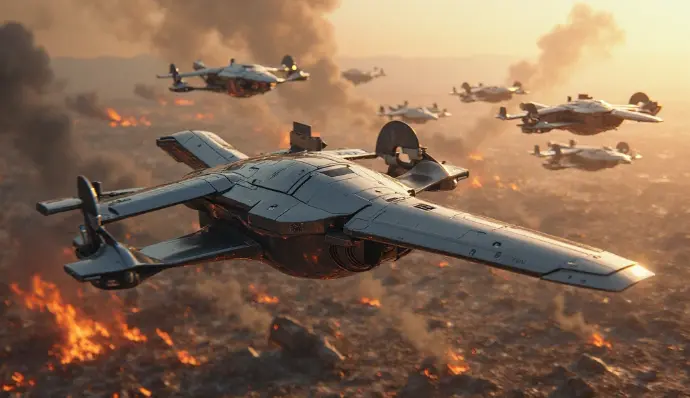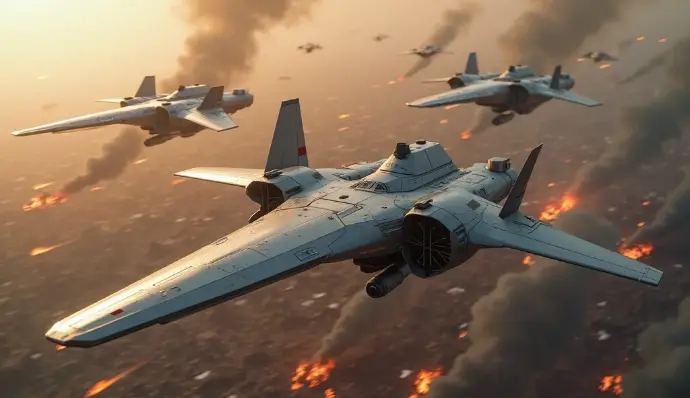The Future of AI in Defense: How Will It Change Modern Warfare?
In our feature article, "The Future of AI in Defense: How Will It Change Modern Warfare?" you'll delve into the exciting world of artificial intelligence applied to defense. Discover how this technology is transforming today's warfare landscape and challenging established norms. Get ready for a fascinating journey through the future possibilities of artificial intelligence in the military!
Introduction
We'll explore how AI is revolutionizing defense, analyze its current applications, and reflect on the ethical and moral challenges posed by its use in this context.
Artificial intelligence has sparked a revolution in the field of defense, offering unprecedented capabilities for analyzing large volumes of data, autonomous decision-making, and automating complex tasks. Advances in machine learning algorithms and neural networks have enabled the development of systems with cognitive capabilities, capable of processing information in real time and adapting to changing environments.
In the context of modern warfare, AI is being applied in the development of autonomous weapons systems, cybersecurity, surveillance, and pattern recognition, radically transforming military strategies and tactics. Furthermore, AI is being used to improve operational efficiency, logistics, and real-time decision-making, giving armed forces a significant advantage on the battlefield.
The impact of AI on defense is undeniable, and its evolution raises questions about the balance between technological innovation and global security, as well as the need to establish regulatory frameworks that ensure the ethical and responsible use of these technologies.
The applications of artificial intelligence in defense are diverse and constantly evolving. Autonomous weapons systems, such as drones and unmanned ground vehicles, are being equipped with autonomous decision-making capabilities, raising ethical and legal challenges regarding the responsibility of their actions on the battlefield.
On the other hand, AI is being used to analyze large volumes of data from diverse sources, such as satellites, sensors, and surveillance systems, allowing for the identification of potential threats, prediction of enemy movements, and optimization of military operations planning.
Furthermore, in the field of cybersecurity, AI is being used to proactively detect and neutralize cyber threats, protecting communications networks and information systems from increasingly sophisticated cyberattacks.
The use of artificial intelligence in defense raises ethical and moral challenges that must be urgently addressed. The autonomy of lethal autonomous weapons, for example, raises questions about human responsibility and control in the use of military force, as well as the possibility of catastrophic errors in conflict situations.
Likewise, the massive data collection and large-scale surveillance enabled by AI raise concerns about privacy, individual freedom, and the potential misuse of these technologies by authoritarian regimes or totalitarian governments.
Finally, the need to establish international standards governing the development and use of AI in defense becomes imperative, in order to avoid an uncontrolled arms race and ensure that these technologies are used ethically and responsibly, preserving the safety and well-being of the global population.
Future Scenarios
The integration of artificial intelligence into autonomous weapons systems represents a significant advancement in the military. These systems have the ability to make independent decisions, raising ethical and legal questions about their use in armed conflict. Proponents of this technology argue that it can reduce the loss of human life when performing high-risk missions, while critics warn of the risk of triggering a large-scale conflict due to the lack of human control in decision-making.
The implementation of AI in autonomous weapons systems also poses challenges in terms of oversight and maintaining security during their operation. The possibility of these systems being hacked or manipulated by hostile actors is a major concern that must be addressed to ensure their responsible use on the battlefield.
The impact of artificial intelligence on defense is especially significant in the ability of armed forces to conduct operations more efficiently and accurately, while raising questions about the morality and responsibility associated with the use of lethal autonomous technologies.
Cyberwarfare, driven by the advancement of artificial intelligence, represents a growing threat to global security. AI-supported cyberattacks have the potential to wreak havoc on critical infrastructure, communication systems, and defense networks. Artificial intelligence's ability to identify and exploit vulnerabilities in computer systems, combined with its ability to rapidly adapt defenses, poses significant challenges for protecting nations against these types of threats.
Furthermore, cyberwarfare can also have repercussions in the political and economic spheres, as cyberattacks can be used to influence decision-making and destabilize entire economies. The intersection of artificial intelligence and cyberwarfare raises the need to develop advanced cyber defense strategies and strengthen international cooperation to address this growing threat.
The impact of artificial intelligence on cyberwarfare is evident in the evolution of tactics and techniques used in cyberattacks, highlighting the importance of cybersecurity in the context of national defense and global security.
The impact of artificial intelligence on defense poses significant challenges for global security, as the proliferation of these technologies can alter the balance of power between nations and generate geopolitical tensions. The race to develop AI-based military capabilities can intensify competition between world powers and lead to an escalation in the development and deployment of advanced weapons.
Furthermore, the lack of clear international standards and protocols to regulate the use of artificial intelligence in the military sphere increases uncertainty surrounding its impact on international stability and security. The need to establish regulatory frameworks and international agreements governing the use of artificial intelligence in defense becomes increasingly pressing as this technology continues to evolve and expand.
The impact of artificial intelligence on global security requires a comprehensive approach that addresses not only the technical and operational aspects, but also the ethical, legal, and geopolitical implications of its application in the military sphere.
Ethical and Legal Considerations
With the advancement of artificial intelligence in the field of defense, there is a growing need to establish clear accountability and transparency protocols. It is crucial that AI systems used in the military context be designed and programmed in a way that allows them to be held accountable for their actions. Transparency in the development and application of these technologies is essential to ensure their ethical use and to maintain trust both nationally and internationally.
Developers and users of AI systems in defense must assume responsibility for ensuring that these systems operate ethically and respect international humanitarian law. Implementing transparency and accountability mechanisms will help mitigate the risks associated with the use of artificial intelligence in military contexts, while fostering informed and ethical debate about its application.
In this regard, it is essential to foster collaboration between governments, international organizations, ethics experts, and technology developers to establish clear guidelines that promote accountability and transparency in the use of artificial intelligence in defense.

The Role of AI in National Defense
Artificial intelligence (AI) is significantly impacting the way national defense strategies are developed. With the advancement of technology, governments and militaries are exploring new ways to use AI to strengthen security and protect against both internal and external threats. The development of defensive strategies is undergoing an unprecedented transformation thanks to the implementation of AI systems that enable the analysis of large volumes of data in real time, the identification of patterns, and the prediction of possible scenarios.
AI is also being used to optimize real-time decision-making, enabling a more agile and effective response to emergencies or unexpected attacks. Furthermore, AI's ability to identify vulnerabilities in defense systems has led to a proactive approach to identifying and mitigating potential risks, which has strengthened national defense strategies.
In this sense, the impact of artificial intelligence on defense is becoming increasingly evident, as it is enabling the development of more robust, adaptable, and effective strategies to protect national security.

The development of defensive strategies has been enhanced by the use of artificial intelligence in threat identification, vulnerability analysis, and the optimization of real-time decision-making. This has made it possible to strengthen national security and anticipate potential risks, transforming the way defense challenges are addressed.
The implementation of AI systems has enabled the analysis of large volumes of data to identify patterns, predict scenarios, and make informed decisions, which has enriched the formulation of more effective and adaptive defensive strategies. In this way, AI is playing a fundamental role in the development of strategies that allow governments and armed forces to protect the sovereignty and security of their nations more efficiently.
The development of defensive strategies has seen significant progress thanks to the implementation of artificial intelligence, which has made it possible to strengthen national security and anticipate potential threats.
The impact of artificial intelligence on defense is also reflected in the strengthening of the armed forces' offensive and deterrent capabilities. AI has enabled the development of advanced weapons systems and combat technologies that have revolutionized the way military operations are conducted.
Furthermore, AI's ability to analyze data in real time and predict scenarios has strengthened deterrent capabilities, allowing for anticipation of potential threats and more effective preventive measures. This has contributed to deterring potential adversaries, strengthening the defensive posture of nations that use artificial intelligence in the military.
In this sense, AI has not only impacted the development of defensive strategies but has also enhanced the armed forces' offensive and deterrent capabilities, strengthening their position on the international stage.
The impact of artificial intelligence in defense has fostered international collaboration in the development and implementation of AI technologies in the military field. Several countries are working together to share knowledge, experiences, and resources to enhance their defensive capabilities through artificial intelligence.
This collaboration has enabled the exchange of best practices, the joint development of technologies, and the creation of international standards for the ethical and responsible use of AI in defense. It has also contributed to strengthening global security by promoting cooperation and information sharing in defense matters.
The impact of artificial intelligence in defense has fostered international collaboration in the development and implementation of AI technologies, which has strengthened global security and laid the foundation for the ethical and responsible use of AI in the military field.
Conclusions
The advancement of artificial intelligence (AI) in the field of defense poses a delicate balance between technological progress and global security. On the one hand, AI innovations can offer unprecedented capabilities for early threat detection, strategic decision-making, and the execution of military operations. However, this same technological advancement also poses challenges in terms of cybersecurity, potential vulnerabilities, and the possibility of escalation in international conflicts.
It is crucial that governments and international organizations work together to establish protocols and regulations that guide the development and deployment of AI systems in the military. This collaboration is essential to ensure that advances in AI contribute to global security and stability, rather than undermine them.
Furthermore, it is necessary to consider the ethical and moral impact of AI in defense, ensuring that its implementation is carried out responsibly and in compliance with fundamental humanitarian principles.
The use of artificial intelligence in defense presents several significant challenges and opportunities. On the one hand, AI can improve the accuracy and effectiveness of weapons systems and optimize decision-making in conflict situations. However, overreliance on AI also poses challenges in terms of vulnerabilities and potential cyberattack scenarios.
Furthermore, the development of AI systems in the military requires a comprehensive approach that encompasses personnel training, integration with existing systems, and consideration of potential legal and ethical implications. At the same time, AI also offers opportunities to improve security and reduce risks for military personnel, as well as to develop more effective and adaptive defense strategies.
In this regard, it is essential to address these challenges proactively, taking advantage of the opportunities offered by AI in defense while mitigating the associated risks. International dialogue and interdisciplinary collaboration are key to ensuring that the use of AI in the military contributes to a more secure and stable future for the global community.

 IHRO NEWS
IHRO NEWS